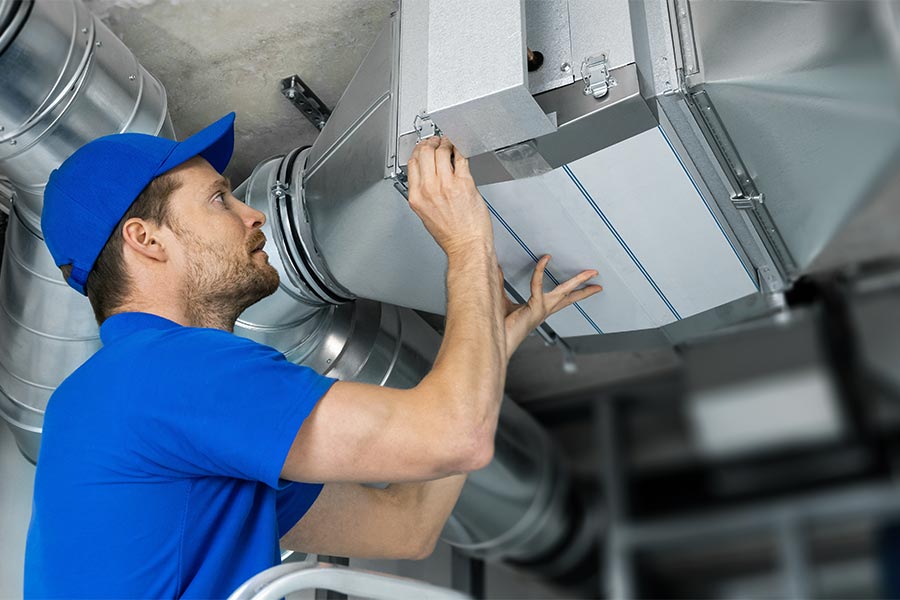Discovering the Necessary Components of a Reliable Cooling And Heating System
An efficient heating and cooling system is improved numerous important parts that work in harmony. Each component, from the thermostat to the ductwork, plays an important duty in keeping comfort and power effectiveness. Recognizing these elements is crucial for maximizing performance and boosting indoor air quality. As one examines these elements, the detailed relationships between them disclose understandings right into boosting overall system performance. What specific variables contribute most to this performance?
The Duty of the Thermostat in Cooling And Heating Effectiveness

Although usually overlooked, the thermostat plays an important role in the effectiveness of HVAC systems. HVAC experts. This tiny device functions as the key nerve center, regulating temperature setups and ensuring optimal comfort within an area. By properly noticing the ambient temperature level, the thermostat connects with the ventilation, home heating, and air conditioning units to maintain the preferred climate
An efficient thermostat minimizes power intake by turning on the HVAC system just when essential, therefore avoiding too much heating or air conditioning. Modern wise and programmable thermostats boost this performance even more by allowing individuals to establish routines and from another location adjust setups, adapting to everyday regimens.
The positioning of the thermostat is necessary; incorrect area can lead to inaccurate temperature level readings, resulting in ineffective operation. On the whole, a well-functioning thermostat not only boosts convenience yet additionally adds markedly to energy financial savings and the longevity of the heating and cooling system.
Understanding the Value of Air Filters
Air filters offer an important feature in HVAC systems by ensuring that the air distributing within an area stays healthy and balanced and tidy. These filters trap dust, irritants, and various other contaminants, stopping them from being recirculated throughout the atmosphere. By catching these bits, air filters add to enhanced interior air high quality, which can substantially benefit passengers' health, especially those with allergic reactions or breathing conditions.
Additionally, maintaining clean air filters boosts the efficiency of HVAC systems. Clogged up filters can restrict air flow, creating the system to function tougher to maintain desired temperatures, bring about boosted energy consumption and greater energy bills. On a regular basis replacing or cleaning filters is a vital upkeep step that can prolong the life-span of cooling and heating devices. Ultimately, comprehending the importance of air filters allows homeowners and structure supervisors to take proactive actions to assure a well-functioning, reliable HVAC system that advertises a safe and comfy indoor atmosphere.

The Capability of the Furnace and Heatpump
Heaters and heatpump are vital elements of a/c systems, in charge of supplying warmth during colder months. Heating systems operate by home heating air with burning or electrical resistance, then distributing it throughout the home by means of air ducts. They generally provide quick heating and can be sustained by gas, electricity, or oil, relying on the system type.
Conversely, heatpump move warmth as opposed to create it. They remove warmth from the outdoors air or ground, even in low temperatures, and transfer it inside. HVAC experts. This double performance enables heatpump to also provide air conditioning in warmer months, making them functional choices for year-round environment control
Both systems need correct maintenance to guarantee performance and long life. While furnaces master extreme cool, heatpump can be advantageous in modest climates. Comprehending their distinctive capabilities aids home owners in selecting one of the most appropriate alternative for their home heating needs.
Exploring the A/c Device
The cooling unit is an important part of heating and cooling systems, available in different types to fit various demands. Recognizing the effectiveness rankings of these units is necessary for making informed options concerning power consumption and expense. This area will check out the diverse kinds of ac system and make clear how efficiency scores effect efficiency.
Kinds Of Air Conditioners
While numerous factors influence the option of cooling systems, comprehending the various types offered is crucial for homeowners and structure managers alike. Central air conditioners are made to cool entire homes or buildings, making use of a network of ducts for air flow. Home window devices provide an even more localized remedy, perfect for solitary spaces or small areas. Portable air conditioning unit give adaptability, permitting individuals to move the system as required. Ductless mini-split systems are an additional choice, integrating the effectiveness of central systems with the benefit of zoning, as they need no ductwork. Geothermal systems harness the earth's temperature for energy-efficient air conditioning. Each type features distinctive advantages, making educated selections crucial for reliable environment control.

Efficiency Ratings Discussed
Comprehending effectiveness ratings is important for selecting the right air conditioning device, as these metrics supply understanding into the system's performance and power usage. The most common score for a/c is the Seasonal Energy Efficiency Proportion (SEER), which determines the cooling output during a regular cooling period separated by the complete electric energy input. A greater SEER indicates much better efficiency. In addition, the Energy Effectiveness Proportion (EER) is More Help utilized for gauging efficiency under details problems. One more essential metric is the Energy Celebrity qualification, which represents that an unit fulfills stringent power performance guidelines. By reviewing these scores, consumers can make educated selections that not only optimize comfort however also lower power costs and ecological effect.
The Significance of Ductwork and Air flow
Effective ductwork design and air movement management play crucial functions in the total effectiveness and efficiency of HVAC systems. Appropriate ductwork assurances that conditioned air is distributed evenly throughout a space, decreasing temperature fluctuations and boosting comfort. Well-designed air ducts decrease resistance to air flow, lowering the work on a/c devices and ultimately lowering energy usage.
Air flow monitoring entails strategically placing vents and registers to boost the circulation of air. This prevents common issues such as warm or chilly places, which can occur when airflow is obstructed or improperly balanced. Additionally, the right duct products and insulation can even more boost performance by decreasing warm loss or gain throughout air transportation.
An efficient ductwork system not just adds to power financial savings but can also extend the lifespan of heating and cooling tools by decreasing unnecessary stress (HVAC experts). Recognizing the relevance of ductwork and air movement is crucial for achieving peak HVAC system efficiency.
Routine Maintenance Practices to Boost Performance
Regular upkeep techniques are vital for making certain peak performance of HVAC systems. These techniques consist of regular evaluations, cleansing, and required repairs to keep the system running effectively. Routinely changing air filters is vital, as stopped up filters can obstruct air flow and lower performance. Additionally, technicians must inspect and clean evaporator and condenser coils to stop overheating and power wastage.
Yearly expert inspections are additionally advised, as experienced specialists can determine possible problems before they rise. Lubricating relocating parts decreases damage, adding to a much longer life expectancy for the system. In addition, making sure that the thermostat operates properly aids in preserving ideal temperature level control.

Regularly Asked Inquiries
How Commonly Should I Change My Thermostat?
Thermostats ought to commonly be replaced every 5 to 10 years, depending upon usage and modern technology advancements. Normal checks are recommended to ensure peak efficiency, particularly if experiencing inconsistent temperature control or boosted energy expenses.
What Dimension Air Filter Is Ideal for My A/c System?
The very best dimension air filter for a heating and cooling system varies by system style. Usually, it's crucial to consult the owner's guidebook or inspect the existing filter measurements to assure peak performance and air quality.
Can I Install a Heatpump Myself?
Installing a warmth pump independently is possible for proficient people, however it needs understanding of regional codes and electric systems. Hiring an expert is suggested to ensure appropriate installment and perfect system performance.
How Do I Know if My Ductwork Is Effective?
To figure out ductwork performance, one must inspect for leaks, procedure air movement at vents, evaluate insulation high quality, and assess temperature level distinctions between supply and return air ducts. Specialist evaluations can supply extensive understandings right into total performance.
What Are Indicators My Heating And Cooling Demands Immediate Upkeep?
Indicators that a HVAC system requires prompt upkeep include my review here uncommon sounds, irregular temperatures, increased energy costs, unpleasant odors, and constant biking. Resolving these problems quickly can prevent additional damages and warranty about his top system efficiency.
Air filters serve an important function in Heating and cooling systems by guaranteeing that the air distributing within a room remains healthy and tidy. Additionally, keeping clean air filters improves the performance of Cooling and heating systems. Ductless mini-split systems are an additional option, integrating the performance of central systems with the comfort of zoning, as they need no ductwork. Recognizing efficiency scores is important for selecting the appropriate air conditioning unit, as these metrics offer understanding into the system's performance and power intake. The best size air filter for a HVAC system varies by unit layout.